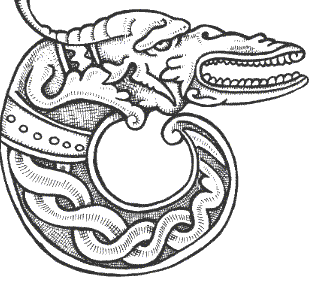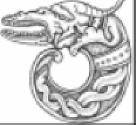Then came King Harold to Sandwich, where he awaited his fleet; for it was long ere it could be collected: but when it was assembled, he went into the Isle of Wight, and there lay all the summer and the autumn. There was also a land-force every where by the sea, though it availed nought in the end. It was now the nativity of St. Mary, when the provisioning of the men began; and no man could keep them there any longer. They therefore had leave to go home: and the king rode up, and the ships were driven to London; but many perished ere they came thither. When the ships were come home, then came Harald, King of Norway, north into the Tine, unawares, with a very great sea-force -- no small one; that might be, with three hundred ships or more; and Earl Tosty came to him with all those that he had got; just as they had before said: and they both then went up with all the fleet along the Ouse toward York. When it was told King Harold in the south, after he had come from the ships, that Harald, King of Norway, and Earl Tosty were come up near York, then went he northward by day and night, as soon as he could collect his army. But, ere King Harold could come thither, the Earls Edwin and Morkar had gathered from their earldoms as great a force as they could get, and fought with the enemy. They made a great slaughter too; but there was a good number of the English people slain, and drowned, and put to flight: and the Northmen had possession of the field of battle. It was then told Harold, king of the English, that this had thus happened. And this fight was on the eve of St. Matthew the apostle, which was Wednesday. Then after the fight went Harold, King of Norway, and Earl Tosty into York with as many followers as they thought fit; and having procured hostages and provisions from the city, they proceeded to their ships, and proclaimed full friendship, on condition that all would go southward with them, and gain this land. In the midst of this came Harold, king of the English, with all his army, on the Sunday, to Tadcaster; where he collected his fleet. Thence he proceeded on Monday throughout York. But Harald, King of Norway, and Earl Tosty, with their forces, were gone from their ships beyond York to Stanfordbridge; for that it was given them to understand, that hostages would be brought to them there from all the shire. Thither came Harold, king of the English, unawares against them beyond the bridge; and they closed together there, and continued long in the day fighting very severely. There was slain Harald the Fair-hair'd, King of Norway, and Earl Tosty, and a multitude of people with them, both of Normans and English; and the Normans that were left fled from the English, who slew them hotly behind; until some came to their ships, some were drowned, some burned to death, and thus variously destroyed; so that there was little left: and the English gained possession of the field. But there was one of the Norwegians who withstood the English folk, so that they could not pass over the bridge, nor complete the victory. An Englishman aimed at him with a javelin, but it availed nothing. Then came another under the bridge, who pierced him terribly inwards under the coat of mail. And Harold, king of the English, then came over the bridge, followed by his army; and there they made a great slaughter, both of the Norwegians and of the Flemings. But Harold let the king's son, Edmund, go home to Norway with all the ships. He also gave quarter to Olave, the Norwegian king's son, and to their bishop, and to the earl of the Orkneys, and to all those that were left in the ships; who then went up to our king, and took oaths that they would ever maintain faith and friendship unto this land. Whereupon the King let them go home with twenty- four ships. These two general battles were fought within five nights.
This year died King Edward, and Harold the earl succeeded to the kingdom, and held it forty weeks and one day. And this year came William, and won England. And in this year Christ-Church [Canterbury] was burned. And this year appeared a comet on the fourteenth before the kalends of May.

And when his fleet was gathered together, then went he into the Isle of Wight, and there lay all the summer and the harvest; and a land-force was kept everywhere by the sea, though in the end it was of no benefit. When it was the Nativity of St. Mary, then were the men's provisions gone, and no man could any longer keep them there. Then were the men allowed to go home, and the king rode up, and the ships were dispatched to London; and many perished before they came thither. When the ships had reached home, then came King Harald from Norway, north into Tyne, and unawares, with a very large ship-force, and no small one; that might be, or more. And Tosty the earl came to him with all that he had gotten, all as they had before agreed; and then they went both, with all the fleet, along the Ouse, up towards York. Then was it made known to King Harold in the south, as he was come from on ship-board, that Harald King of Norway and Tosty the earl were landed near York. Then went he northward, day and night, as quickly as he could gather his forces. Then, before that King Harold could come thither, then gathered Edwin the earl and Morcar the earl from their earldom as great a force as they could get together; and they fought against the army, and made great slaughter: and there was much of the English people slain, and drowned, and driven away in flight; and the Northmen had possession of the place of carnage. And this fight was on the vigil of St. Matthew the apostle, and it was Wednesday. And then, after the fight, went Harald, King of Norway, and Tosty the earl, into York, with as much people as seemed meet to them. And they delivered hostages to them from the city, and also assisted them with provisions; and so they went thence to their ships, and they agreed upon a full peace, so that they should all go with him south, and this land subdue. Then, during this, came Harold, king of the Angles, with all his forces, on the Sunday, to Tadcaster, and there drew up his force, and went then on Monday throughout York; and Harald, King of Norway, and Tosty the earl, and their forces, were gone from their ships beyond York to Stanfordbridge, because it had been promised them for a certainty, that there, from all the shire, hostages should be brought to meet them. Then came Harold, king of the English, against them, unawares, beyond the bridge, and they there joined battle, and very strenuously, for a long time of the day, continued fighting: and there was Harald, King of Norway, and Tosty the earl slain, and numberless of the people with them, as well of the Northmen as of the English: and the Northmen fled from the English. Then was there one of the Norwegians who withstood the English people, so that they might not pass over the bridge, nor obtain the victory. Then an Englishman aimed at him with a javelin, but availed nothing; and then came another under the bridge, and pierced him terribly inwards under the coat of mail. Then came Harold, king of the English, over the bridge, and his forces onward with him, and there made great slaughter, as well of Norwegians as of Flemings. And the King's son, Edmund, Harold let go home to Norway, with all the ships.
And that same year that he became king, he went out with a fleet against William [Earl of Normandy]; and the while, came Tosty the earl into Humber with sixty ships. Edwin the earl came with a land-force and drove him out; and the boatmen forsook him. And he went to Scotland with twelve vessels; and Harald, the King of Norway, met him with three hundred ships, and Tosty submitted to him; and they both went into Humber, until they came to York. And Morcar the earl, and Edwin the earl, fought against them; and the king of the Norwegians had the victory. And it was made known to King Harold how it there was done, and had happened; and he came there with a great army of English men, and met him at Stanfordbridge, and slew him and the earl Tosty, and boldly overcame all the army.
